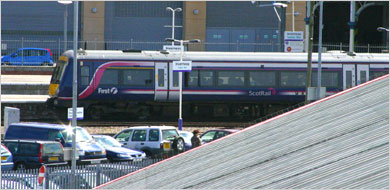The Role of HITRANS and Others
The European Union is responsible for legislation on a range of issues. This includes access to aviation and rail markets, the Working Time Directive and climate change. Within the UK, most transport powers and delivery are a Scottish responsibility.
|
|
However, some powers and policies are still the responsibility of the UK Government and its agencies. Examples include managing some cross-border rail franchises; maritime safety; and vehicle fuel duty.
Transport Scotland
The Scottish Government's transport agency Transport Scotland co-ordinates national transport strategy, and financial and legislative matters related to transport on behalf of the Scottish Government. It is responsible for policy on air, freight, ferry services, ports and harbours, buses and local road provision.
Transport Scotland has funding for a range of activities and services. These include the Air Discount Scheme and Freight Facilities Grants. It is also responsible for procuring many of our major ferry services and the funding and management of our main airports.

|
|
Transport Scotland has specific responsibilities regarding aviation policy, ferry services, the rail and trunk road networks in our area. It is responsible for managing the ScotRail passenger franchise, as well as specifying and funding rail infrastructure work to be undertaken by Network Rail. It is also responsible for planning trunk road investment; procuring and managing delivery of new trunk roads and enhancements; and managing the existing network, including procuring maintenance. Transport Scotland is responsible for the national concessionary travel scheme.
Through Caledonian Maritime Assets Limited (CMAL) the Scottish Government also provides funding for works at harbours used by "lifeline" ferry services.
Local Authorities
Our member local authorities strongly influence the provision of transport within their own areas. The local authorities' responsibilities include: the non-trunk road network; supporting the bus network; footpaths and cycleways; demand responsive transport services; school and social work transport; ownership and/or funding of ferry services; and ownership of airstrips.
|